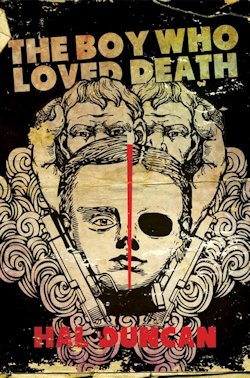It’s been damn near a decade since The Book of All Hours blew my tiny mind. Hal Duncan’s tremendous two-volume debut helped opened my eyes to a whole new world of words upon its release all those eons ago. He’s proven pretty prolific as an author and as an editor in the short story scene since—see Fabbles the first, Scruffians! and Caledonia Dreamin’—and as my two year tenure as co-curator of the Short Fiction Spotlight shows, I hope, I’m a huge fan of the form.
But sometimes a novel is needful. Sometimes authors require the room long-form fiction allows to thoroughly explore a theme or an idea. To wit, I’ve been watching Notes from New Sodom like a hawk, and in April, the aforementioned author teased something called Testament. I reached out to find out more about the project post-haste, and today, it’s my pleasure to tease you about Testament—not to mention The Boy Who Loved Death—in turn.
It’s not the easiest book to encapsulate. Basically though, it’s my anarcho-socialist atheist-humanist remix of the Gospels (all five of them—Matthew, Mark, Luke, John and Thomas). It’s metafiction meets the multiverse, you could say. I’ve taken the source material and edited it into a single narrative, with a bit of (re)translation that puts a whole other spin on it.
Woven through and around that, there’s a metafictional frame: it’s presented as the editing work of one disciple, who’s commenting as he restores the “true story,” elucidating this or that episode with richer scene-setting, drawing out connections that are hidden between the lines, out to undo twenty centuries of anti-semitism and Roman apologism. There’s an interpersonal drama that emerges in that frame, the human story you’d want in a contemporary novel. It’s also fantasticated though, with something like the Moorcockian multiversal approach you get in Vellum, translating the context so, for example, Capernaum becomes a Hebridean fishing village in the 1970s. I don’t want to give away spoilers, but there are nods to PKD’s late works—VALIS and suchlike. It’s a high concept book, for sure.
No wonder it’s been ten years in the making!
Actually, Testament has been on the drawing board for a lot longer than that:
Ever since arguing with my Sunday School teachers over scripture that clearly did not mean, by my reading, what they said it did, I’ve had… a bit of a beef with the spin put on the Gospels by a faction of Christianity that owes more to Paul than that nice young rabbi who was killed by the Roman Empire as a political dissident. I look at the power structures it’s built up over twenty centuries, and I see the exact fucking Pharisees that Yeshua was challenging, always have done.
So I’ve been building up to writing this novel, really, since I was twelve or so, and it seems more timely now than ever. There’s a story in those Gospels that’s hugely relevant in the era of Occupy and Anonymous, and in the context of US fundamentalism, neck-deep in the “Kill the Gays” bill in Uganda, fighting gay rights with “religious liberty” legislation, and so on. If you want to look closer to home, look at the faux-Christianity of the faction currently kicking up an odious stink in the SFF community. Testament is my answer to that shit, and the answer is pretty much ¡No pasarán!
Nor should they.
Hark! The Testament of Hal Duncan shall be upon us shortly. The publisher, Eibonvale Press, is currently targeting a release date in late July.
Also coming up this summer on the Hal Duncan front: his second short story collection proper. Look for The Boy Who Loved Death out of Bizarro Pulp Press.
Good God, it’s a fine time to be a Hal Duncan fan—as I am.
Niall Alexander is an extra-curricular English teacher who reads and writes about all things weird and wonderful for The Speculative Scotsman, Strange Horizons, and Tor.com. He’s been known to tweet, twoo.










